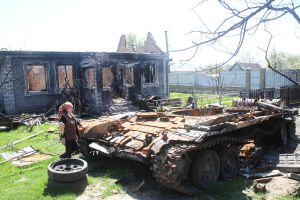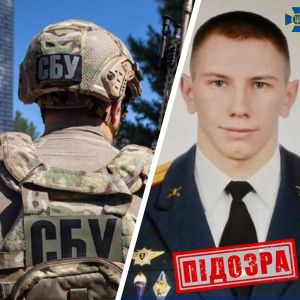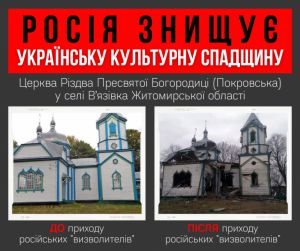When you come to Bucha, Irpin and Hostomel, destroyed and looted by russian occupants, where people already cleared the streets from dead bodies and devastated vehicles, where houses remain without doors, windows and roofs, where only walls remain standing, though the rest has burned down, where the cottages turned into pieces of bricks − first, you feel the shock and then fear, because the enemy keeps ravaging the Ukrainian towns and villages. Then, you feel surprised: our northern neighbors keep shouting from their TV screens that Ukrainians and russians are brotherly nations. And then it appears that they are brutal barbarians, monsters, beasts disguised as humans − in the 21st century. And then come rage and hatred, because we’re not going to forgive the crimes in our homeland. For some time, you can’t get rid of the thought that it’s impossible, and it’s not true; it’s just the decorations for horror movie. Unfortunately, it is wrong…
There’s a long list of Makariv, Motyzhyn, Shevchenkove, Velyka Dymerka and so on. Russian occupants opened the doors to real hell here – just like in Mariupol, Volnovakha, Borodyanka, Kharkiv and Kherson. The ground burned under the feet, and the metal melted; its pieces that still lie on the ground resemble melted chocolate that takes most unusual shapes when it freezes. A monitor and the gas stove stands in the middle of a flower bed next to one of the demolished houses, as if it was on the table. They must have been tossed away from the house by the blast wave. A green curtain hangs from the inside of the apartment, facing the street… The blue and yellow flag dances in the wind, hanging from the other smoked window on the second floor. How did it remain intact? Maybe someone hoisted it after the fire - to make the statement that Irpin in Ukraine.
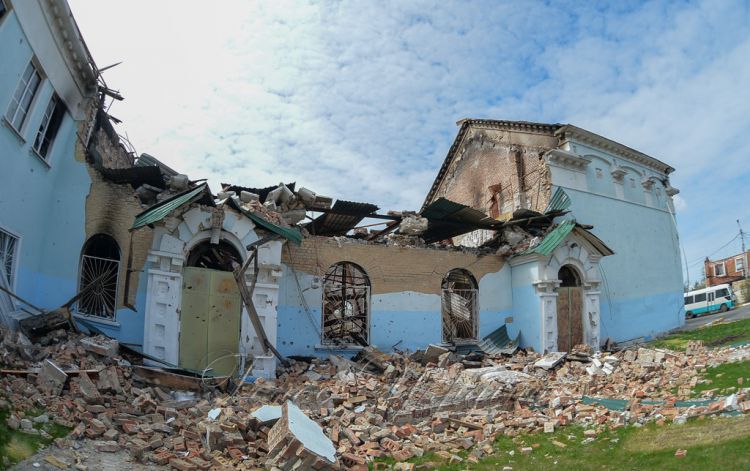
It’s empty in the destroyed houses. Once people lived and made plans here. Where are they now? Are they still alive? Plenty of human lives burned in fire of the hell started by the russian occupants. According to the official data, at least 1,000 civilians deceased by their hands in Kyiv region. Chairman of police of Kyiv region Andriy Nebytov claims that most of these people were shot dead.
Anatoliy Fedoruk, the mayor of Bucha says that russians killed the locals according to the lists they complied in advance. «They had lists, and I saw them. That is, they definitely knew in advance where they were going. They knew the addresses and who lived there», he claimed. According to him, among the people who were supposed to be killed, there were names of local officials, politicians. «Thank God, they had some opportunities to leave Bucha, and they left, so that they (russians) took those who stayed. Most of these people were the activists and members of Donbas conflict», Anatoliy Fedoruk added.
Mykhailo Romanyuk was killed in the first few days of war in Bucha that was occupied for 33 days. He was riding his bicycle, on his way to the military enlistment office. He wanted to join the local territorial defense force and protect his town from the enemy. «He claimed he could not stay in the basement when the aggressors want to grab our land», his mother said. «He said it was most heartbreaking for him. He wanted to go to the military enlistment office and tried to soothe me, telling me he would live long». Viktoriya Batura, the resident of Bucha told that russians fired at Mykhailo and her son-in-law, shooting from the first floor of a living hose. Romanyuk took a bullet to his head. Mykhailo’s body laid next to his bicycle on the street – just like the bodies of other executed fellow residents, until the day when the town was liberated by the Ukrainian troops.
The police of Kyiv region continue to document the crimes committed by russian forces during the occupation–- cases of murders, rapes, tortures of children and looting. Law enforcers already identified almost 200 russian soldiers that committed these atrocities in towns and villages of Kyiv region. Besides, Captain Aleksei Bulgakov and Major Aleksandr Vasiliev from the Motor Company of the 15th Brigade of the 2nd Guards Army of the Central Military District (military unit 90600 in russia’s Samara oblast) have been suspected in absentia. These men faced charges with cruel treatment of prisoners of war and civilians. In March, during the occupation of Bohdanivka village, Brovary region, the captain ordered to search Ukrainian military servicemen, members of the National Guard and territorial defense force, veterans of Donbas conflict and police workers among the locals. They managed to capture the fighter of territorial defense. They tied his hands behind his back, took him to the ground and used the rifle butt to hit his back, arms and legs. The major would step on his fingers. After the tortures, the captured man was thrown into the basement. They gave him no food or water.
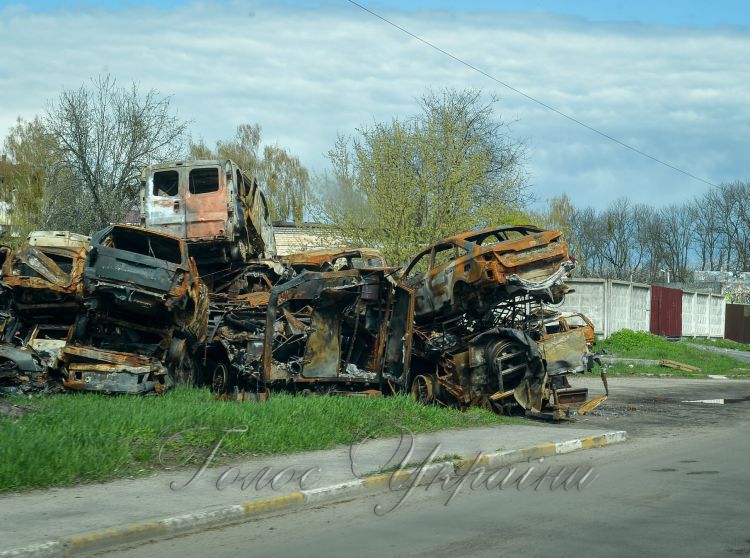
Russians also tortured the local priest; they undressed him, made him wear a hat so that it would cover his eyes, tied his hands behind his back and beaten him. The priest recognized his torturer on the photo that he shared in social networks. It was Vasiliev.
Photo by Andriy Nesterenko




